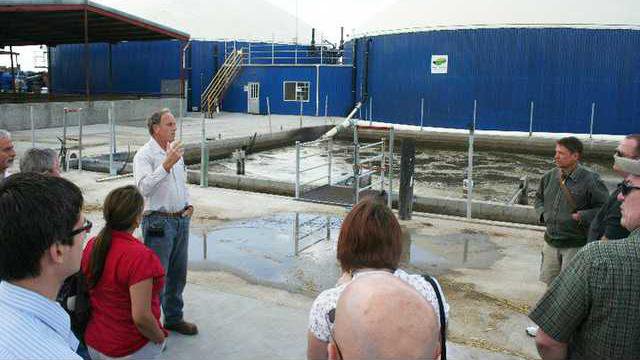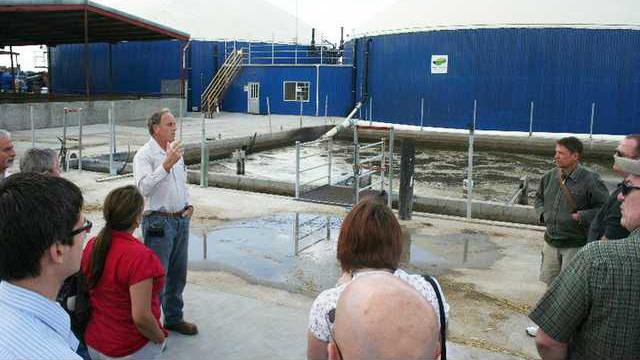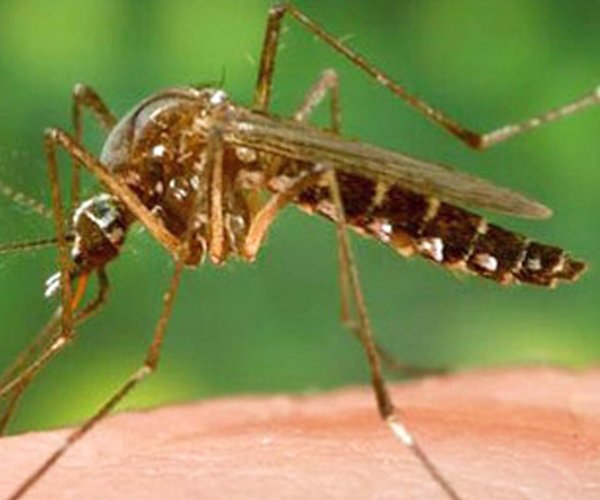Fiscalini Farms, a Stanislaus County 1,500-cow dairy, is leading the charge in California to prove that the business end of a cow’s digestive track can be effectively used to generate power.
Owner, John Fiscalini is dedicated to his new renewable energy system, which is actually fairly simple — unlike the regulations and hurdles Fiscalini has had to overcome.
Manure to electricity process
Everyday Fiscilini’s cows are stored in free stall barns and every day the barns are flushed with water to clean off fecal matter. The resulting slurry product is collected and drained to create manure rich sludge, which is then pumped into the digester. The leftover water is re-used to again flush out the cow barns.
Other materials such as feed and lawn clippings can also be put into the tanks. The digester itself consists of two round above-ground concrete tanks. Each tank is 86 feet in diameter, 26 feet in height and holds as much as 860,000 gallons.
Sludge inside the tank is heated to 100 degrees and bacteria breaks down the manure particles in the tank to create methane. The methane is captured inside an expandable rubber bladder and piped outside of the tank where it is cooled and transferred to a combined heat and power engine, designed to burn biogas and create electricity and hot water.
The 710 kilowatts of electricity is then sold to Modesto Irrigation District (MID), enough to power as much as 200 homes in a nearby community.
In addition, the hot water is used in the farm’s cheese making process.
Cost versus profit challenge
The biggest problem for Fiscalini is that the cost of the digester doesn’t justify the return on investment. The project took more than three and a half years and $4 million to complete, mainly because of regulations implemented by a host of governmental bodies.
Fiscalini has had help financially in the form of grants and assistance from the California Energy Commission and the U.S. Department of Agriculture.
According to Western United Dairymen Communications Director Mark Looker, the costs of the digester each month is about $32,000 — as much as Fiscalini gets back from MID.
“It is a wash for return on investment. A lot of dairymen aren’t willing to spend that much money for such a little return,” said Looker.
“When I started this three and a half years ago I expected to be one of many in California, but we are the only one of this size,” explained Fiscalini.
‘Whack-a-mole’ regulations damper digester viability
On Wednesday, Fiscalini sounded off about the hurdles he faced trying to make his project work when he hosted dozens of stakeholders, government officials and media for a tour of his facility.
“The reason we are the only dairy attempting a digester of this size is regulation, additional regulation, over-regulation and burdensome regulation. And I believe there are a few regulators that would like to regulate the regulations,” said Fiscalini.
Regulations from agencies ranging from water districts to air pollution boards have hampered the project’s financial feasibility.
“Economic feasibility on a digester in the U.S. is not something that happens,” said Fiscalini.
Fiscalini said the primary reason the project is struggling is because of a regulation that allows him to create electricity from on-site waste materials only.
“Manure, left over feed, and lawn clippings go into the digester, but we are restricted to not put anything in except what we produce on site,” explained Fiscalini. “The facility could take restaurant waste, poultry processing waste and cannery waste.”
Fiscalini said his facility could produce two to three megawatts of electricity if regulations were eased — enough to power as many as 3,000 homes.
For Fiscalini the solution for increasing productivity and economic viability is simple. “Either reduce cost of the construction — that’s not going to happen — or allow off-site waste to be brought in,” he said.
U.S. Representative Jeff Denham (R- Atwater), who attended Fiscalini’s tour, expressed his desire to ease restrictions on innovative projects.
Western United Dairymen CEO Michael Marsh called the regulatory hurdles for Fiscalini a “whack-a-mole” arcade game.
“WUD has been working with the legislature, the PUC, the water boards and the air districts to facilitate these innovative projects for over 10 years. Unfortunately, it seems that it's been a bit of a ‘whack-a-mole’ arcade game. Once one bureaucratic hurdle is cleared, another is created. The Legislature and the regulators need to get behind these projects so that they can work economically for the dairy farm families. Otherwise, they will languish.
“The dairy industry is extremely valuable to the Central Valley and our economy. Fiscalini Farms is a great example of how the private industry is developing creative solutions to allow the dairy industry to thrive and create jobs in our state. We must eliminate burdensome regulations that continue to hinder these efforts,” he said.
Concerns about potential air pollution cause government agencies to be wary of the project, but Fiscalini said concerns are unfounded.
“In reality, we’ve taken the equivalent of 25 cars off the road and added one diesel truck,” he said.
Despite the cost and hurdles, hope remains for the project. Recently, the California Energy Commission awarded Fiscalini a six-month grant to study how off-site fuel could improve the project.
Should the results of the study prove promising, restrictions could ease off-site digester fuel and profitability could increase for Fiscalini, and, potentially, dairies throughout the state could start taking notice. Ultimately, the dairy industry could lead California’s renewable energy push, ironically enough.
To contact Jonathan McCorkell, e-mail jmccorkell@turlockjournal.com or call 634-9141 ext. 2015.





